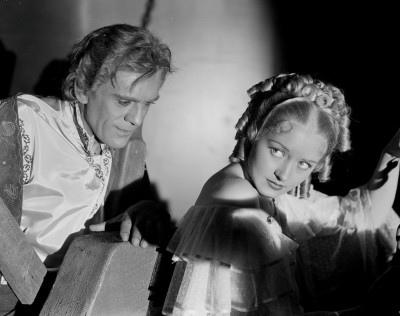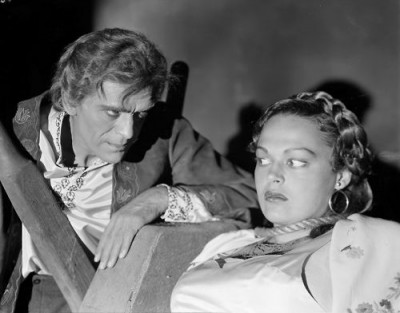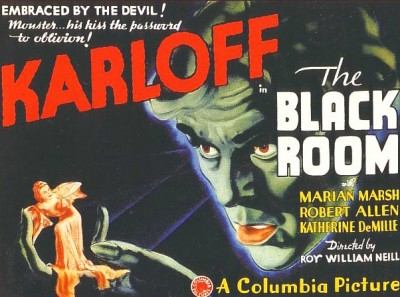
Columbia Pictures was never really a major player in the horror genre during what we loosely term the “golden age.” They didn’t jump on the bandwagon created by the success of Dracula (1931) and Frankenstein (1931). Apart from Ben Stoloff’s Night of Terror (1933) — arguably the first slasher picture and definitely the first movie designed as a Bela Lugosi vehicle — their stabs at the genre were kind of tentative. In fact, when their TV subsidiary, Screen Gems, created the first “Shock Theater” package in 1957, it was made up of Universal titles they’d licensed. It wasn’t until the “Son of Shock” package in 1958 that it occurred to Columbia to add any of their own titles to the mix. One of those added — which means it became a TV standard for a generation of horror fans — was Roy William Neill’s The Black Room (1935), a surprisingly elaborate and expensive (relatively speaking) genre effort that had the misfortune of arriving just one year before the censors called for a moratorium on the horror film. As a result, what might have given the studio a strong stake in the genre became a one-off oddity — and one that seems to have become largely overlooked today.

The Black Room is a rarity in that it’s very much a period film. The films surrounding it — with the exception of Bride of Frankenstein (1935), which takes place in a wholly nebulous period — had modern settings. Of course, they were modern settings with gothic trappings — and today they feel like period pictures — but they were modern. Then — as now — period pictures were automatically more expensive undertakings, though the existence of the studio system with its left-over sets and props and even costumes could still be fairly economical. The Black Room, however, looks elaborate and very solid, but it’s most notable for giving Boris Karloff one of his roles — or two of his best roles since he plays twins. He plays the sons of an old family — a family with a prophecy that it began with twins and will end with twins. One of the original twins murdered his brother and hid his body in the black room of the title. A similar fate is said to await these new twins — Gregor and Anton — though the family attempts to circumvent this by blocking up the black room. But…well, you know how these old castles are with their secret passages.

Time passes and the twins grow to manhood, even to middle-age. The younger brother, Anton, has traveled abroad and become a kindly, cultured man. Gregor, on the other hand, stayed on to become the Baron — and a nasty piece of goods, he is. His specialty seems to be kidnapping and murdering the young women of the province (no prizes for guessing where he stashes the bodies). In fact, things have gotten so hot for him that he’s sent for Anton — supposedly to abdicate in his brother’s favor. Of course, what he really plans on doing is murdering Anton and taking his place — a tricky proposition because Anton has a paralyzed arm — and availing himself of the hand (and other body parts) of leading lady Marian Marsh. The film boasts stylish direction, first rate music, and a good script. But what makes all this work so well is Karloff, who fully invests himself in the roles and creates two distinct characters. Not surprisingly, Gregor is the more interesting of the two — his speech about pears is a classic — but both come across as wholly believable.
The Thursday Horror Picture Show will screen The Black RoomThursday, August 1, at 8 p.m. in the Cinema Lounge of The Carolina Asheville and will be hosted by Xpress movie critics Ken Hanke and Justin Souther.




And tv was where I first was scared by it, being the young tyke that I was.
Hey, at least you aren’t old enough to have caught it on its original release.
This was always one of my favorite early Karloff films. As a kid I found the ending rather gruesome with the imagery of it sticking with me for days. It was also the first time I saw split screen technology and when there were 2 Karloffs in the same frame I was astounded. And you’re right Ken, the pear speech IS a classic.
Deja vu. I recorded this on TCM a couple of years ago, but just got around to watching it last week (along with Black Moon).
Very nice. It reminded me of just how good Karloff was at this. Though my favorite line of his is in The Terror when he breaks into a devilish smile and smirks to Jack Nicholson, “You think I’m mad, don’t you?”
Few one could pull something like that off as well as Karloff.